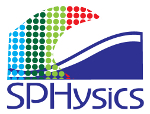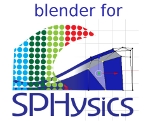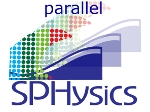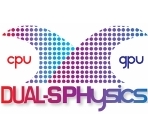







From SPHYSICS
(→<big>'''v1.0 DualSPHysics CPU-GPU Code RELEASED: January 2011''' </big>) |
(→SPHysics - SPH Free-surface Flow Solver) |
||
| Line 8: | Line 8: | ||
|- | |- | ||
|} | |} | ||
| + | <embed src="http://cfd.mace.manchester.ac.uk/sph/images/Website_Banner_002_900x200_bitRate768.swf" quality="high" bgcolor="#ffffff" width="900" height="200" name="0" align="middle" allowScriptAccess="sameDomain" type="application/x-shockwave-flash" pluginspage="http://www.macromedia.com/go/getflashplayer" > </embed> | ||
{| style="background-color:#edebe7;" cellpadding="20" | {| style="background-color:#edebe7;" cellpadding="20" | ||
| Line 25: | Line 26: | ||
#'''[[SPHYSICS Reference| How to reference SPHysics]]''' | #'''[[SPHYSICS Reference| How to reference SPHysics]]''' | ||
#'''[[Help:Contents| Help and Info about SPHysics website]]''' | #'''[[Help:Contents| Help and Info about SPHysics website]]''' | ||
| − | !align="right" | <embed src="http://stream.manchester.ac.uk/player.swf" width="280" height="240" allowscriptaccess="always" allowfullscreen="true" flashvars="height=240&width=280&file=27366824_lo.mp4&streamer=rtmp://flash.stream.manchester.ac.uk/media/mp4:&searchbar=false&autostart= | + | !align="right" | <embed src="http://stream.manchester.ac.uk/player.swf" width="280" height="240" allowscriptaccess="always" allowfullscreen="true" flashvars="height=240&width=280&file=27366824_lo.mp4&streamer=rtmp://flash.stream.manchester.ac.uk/media/mp4:&searchbar=false&autostart=false&image=http://wiki.manchester.ac.uk/sphysics/images/Screenshot-newFrontPage_0001_mpeg4_cropped.png"> </embed> |
|} | |} | ||
| Line 31: | Line 32: | ||
<big>'''The SPHysics Code'''</big> | <big>'''The SPHysics Code'''</big> | ||
| − | SPHysics is a platform of Smoothed Particle Hydrodynamics (SPH) codes inspired by the formulation of Monaghan (1992) developed jointly by researchers at the Johns Hopkins University (U.S.A.), the University of Vigo (Spain), the University of Manchester (U.K.) and the University of Rome La Sapienza (Italy). Developed over a number of years primarily to study free-surface flow phenomena where Eulerian methods can be difficult to apply, such as waves, impact of dam-breaks on off-shore structures. We are excited to announce that there are 3 codes available: '''[[Code_Features| Code Features]]''', while future versions can be found under ('''[[Future_developments|Future Developments & Releases]]'''). | + | SPHysics is a platform of Smoothed Particle Hydrodynamics (SPH) codes inspired by the formulation of Monaghan (1992) developed jointly by researchers at the Johns Hopkins University (U.S.A.), the University of Vigo (Spain), the University of Manchester (U.K.) and the University of Rome La Sapienza (Italy). Developed over a number of years primarily to study free-surface flow phenomena where Eulerian methods can be difficult to apply, such as waves, impact of dam-breaks on off-shore structures. We are excited to announce that there are 3 codes available: '''[[Code_Features| Code Features]]''', while future versions can be found under ('''[[Future_developments|Future Developments & Releases]]'''). |
==== <big>'''v2.2.1 Serial Code UPDATE RELEASED: January 2011''' </big> ==== | ==== <big>'''v2.2.1 Serial Code UPDATE RELEASED: January 2011''' </big> ==== | ||
Revision as of 18:33, 18 March 2012
SPHysics - SPH Free-surface Flow Solver
Open-Source Smoothed Particle Hydrodynamics code
 |
 |
 |

|
The SPHysics Code
SPHysics is a platform of Smoothed Particle Hydrodynamics (SPH) codes inspired by the formulation of Monaghan (1992) developed jointly by researchers at the Johns Hopkins University (U.S.A.), the University of Vigo (Spain), the University of Manchester (U.K.) and the University of Rome La Sapienza (Italy). Developed over a number of years primarily to study free-surface flow phenomena where Eulerian methods can be difficult to apply, such as waves, impact of dam-breaks on off-shore structures. We are excited to announce that there are 3 codes available: Code Features, while future versions can be found under (Future Developments & Releases).
v2.2.1 Serial Code UPDATE RELEASED: January 2011
v2.0 Parallel Code RELEASED: January 2011
v1.2 DualSPHysics CPU-GPU Code RELEASED: May 2011
All developers of the SPHysics code are members of SPHERIC which is the SPH European Research Interest Community.
This organisation seeks to promote the development and use of SPH within the academic and industrial communities. Click here for the SPHERIC Home Page